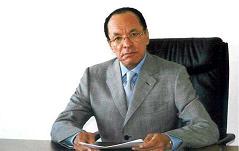Difference between revisions of "Kengo Wa Dondo"
m |
|||
| Line 1: | Line 1: | ||
| − | [[Kengo_Wa_Dondo.JPG]] | + | [[Image:Kengo_Wa_Dondo.JPG]] |
'''Léon Kengo Wa Dondo''' (b. May 22, 1935), was born Léon Lubicz in Libenge, [[Regions of Zaire|Équateur]], [[Zaire]] (then called the [[Zaire#The Belgian administration: Belgian Congo (1908 – 1960)|Belgian Congo]]) to a Polish father and a Tutsi mother. In 1971, in accordance with [[Presidency of Zaire|President]] [[Mobutu Sese Seko]]'s ''[[Popular Movement of the Revolution|authenticité]]'' policy, he adopted an African name: Kengo Wa Dondo. | '''Léon Kengo Wa Dondo''' (b. May 22, 1935), was born Léon Lubicz in Libenge, [[Regions of Zaire|Équateur]], [[Zaire]] (then called the [[Zaire#The Belgian administration: Belgian Congo (1908 – 1960)|Belgian Congo]]) to a Polish father and a Tutsi mother. In 1971, in accordance with [[Presidency of Zaire|President]] [[Mobutu Sese Seko]]'s ''[[Popular Movement of the Revolution|authenticité]]'' policy, he adopted an African name: Kengo Wa Dondo. | ||
Revision as of 22:12, 18 January 2007

While he has never held much power, he has been a key player in Zairian politics for more than two decades. He has served as prime minister three times (November 5, 1982 - October 31, 1986; November 26, 1988 - May 4, 1990; and July 6, 1994 - present) and as foreign minister once (1986 - 1987). He is known for being a strong advocate of free-market economics and austerity measures and for appointing able technocrats to important positions, such as when he appointed Munga Mibindo the President Delegate General of La Société Nationale d'Electricité; Mibindo was an accomplished engineer who had overseen the construction of the Inga-Shaba Electrical Transmission Line Project. In 1994, Kengo was chosen as prime minister for the third time, as a "compromise candidate" suitable to both the President and the parliament. One of his more controversial decisions was ordering the expulsion of Lebanese merchants, ostensibly as a deterrent against illegal diamond mining.
During the Kabila rebellion, he headed an emergency cabinet that, while relatively competent, was constantly undermined by Mobutu loyalists, due to Kengo's Tutsi heritage. He threatened on several occasions to resign, but Mobutu continually persuaded him to retain his post.
Since the war, Kengo has pressured the President to gradually liberalize the economy and open it to foreign investment - to little avail. Despite his limited powers and influence, he is generally respected for his moderation, and for being more of a pragmatic than an ideologue.
